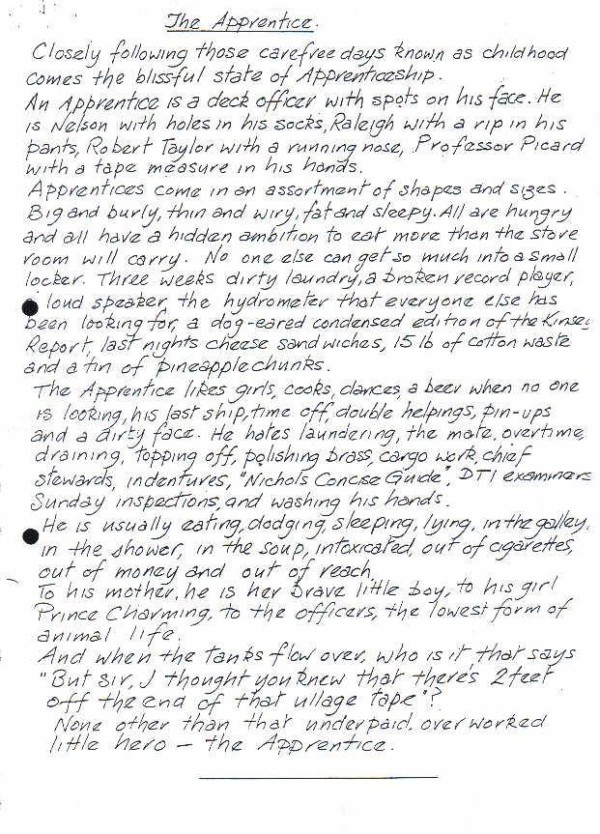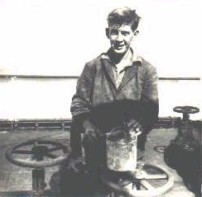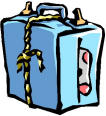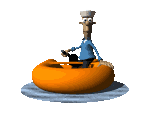
Life as an apprentice |

Memories of other ships I sailed on: We joined the "London Integrity" at Middlesborough immediately after her acceptance trials, some of the guests were still on board, so we the apprentices had to sleep in the ship's hospital, previously occupied by "guests" - We were disgusted with the state of the place and spent hours making it habitable removing bottles, stale canapés, bread and other debris - so much for how the upper crust lived. There was no food left out for us so we staggered across a coal tip and railway sidings until we found a place were we could get fish and chips. Whilst still alongside, plates and lugs were still being cut and welded and a main mast support carried away. On leaving Middlesborough we had dense fog and heavy traffic, the main engines broke down when we were off the Thames Estuary.Later a fault developed on the steam gearing, which blew all electrics on the ship... very quickly oil lamps had to be hoisted to warn ships that we were Not Under Command. The "London Integrity" was a new ship and all pipe lines & drains tested were before acceptance but later ship builders had cemented the transom space bottom, resulting in blocked lightening holes. Alan and I had to clear them - wearing only shorts in very confined space between frames, filled to 4/5 feet with water and oil from the steering flat - we had to dive completely under and hammer and chisel by feel only. Alan and I served full apprenticeship together, he used to get into trouble for, whistling on board, both unmusical and said to be unlucky. After 2 years together his relieving of me on cargo watch became a problem he was getting to be always late - I asked, I warned and it made no difference he only promised, so one port when he hadn't come on deck by 1am despite many calls I emptied a large jug of iced water without further warning over his sleeping form - after that no problem with his time keeping. The first loading port was Punta Cardon and I tried my first attempt at taking photographs of the radar screen. The first discharge port was Piney Point near Washington USA .The engineers went up to Washington, ran out of money and tried to get a "sub" from the British Embassy - without success. When we went ashore we met very friendly types - took us shopping - having telephoned their friends to keep the shop open, then they took us to an inn which had real Red Indian Tomahawks, arrows, `peace pipes etc. etc. on the walls and then they drove us back to the ship where we gave them British fare which they appreciated. The cable claws were fouled by swarf and the ship had to pay 140 dollars to have it cleared, We received 50 grease nipples by air mail to fit where the ship builders had been found to have forgotten to fit !!. Back to Cardon and load for Curacao, but loading was delayed here because the refinery did not have our oil ready for us. It was at this time when we saw the Hunting tanker, ?Duffield? come in. She had had an explosion when tank cleaning, the fore deck was folded back from No 1 across in a circle and a half back to No 3 tanks, so that from their bridge they could just see over the coiled deck - the foremast hung like a broken match over the port side. Luckily we believe that only 2-3 had been killed and about 5 injured. The passage from Curacao to Dakar in French West Africa was 3067 miles which we did at 15.04 knots - a record for the ship. When we got there the shore installation requested a slow discharge - whereas we wanted to see just how well the new ship would perform. It was soon to be Alan's 21st Birthday and as there was some friction between him and the Chief Steward I could see there would be no party. I went into town walking through the poorer areas, bought a couple of curios but could not afford a massive snake skin which I admired because I was saving my cash to buy a 21st birthday cake for Alan. I arrived at an impressive cake shop, no local currency, no French currency only Italian Lire. I could speak no French or local patois. The assistants nor manageress could speak no English - bit of a problem- but this was overcome by my many gestures and doing drawing on a cake box with no great trouble. But as neither party knew the exchange rate lire/local cash that took longer, but was finally agreed. From Dakar we went back to Cardon where the Chief Engineer let me spin for Garfish with his new fishing rod, He caught one about 4ft long but because of their very small mouth it spat the hook just as he was getting it over the ships rail. We then went up to Perth Ambroy to discharge this cargo and thanks to Alan doing a 12 hour cargo watch I was able to get a train up to New York where I visited the apprentices club, world famous for looking after apprentices during World War II. It was run by 2 old ladies, very nice, they gave me tea before I set off to the Empire State building - which believe it or not I had difficulty in finding. I walked round it once before notice was taken of the plate by the door. The trip to the top was really memorable, on the way back to Pennsylvania station I stopped for a meal and tried Californian wine - which to my taste was very pleasant. The railway station also impressed me with its sheer scale, bustle, echo, shops, clean floor and the number of railway tracks.I got back to the ship in time for finishing cargo, we discharged 18,000 tons in 16 hours, total port time in and out 22 hours which we believed was a port record. We then sailed south, this time to Bachaquers on Maricaibo Lake picking up the pilot at Punta Cardon. I was put on the wheel because to get into the lake was "interesting - especially at night"We had to approach the land at right angles then in a narrow channel when at full speed it appeared the bows were about to run ashore, hard a port through 90 degree turn run parallel with the coast very close inshorefor say 1 mile then hard starboard and into the gap and one was in the lake, we went on to Maracaibo and changed pilots, the lake on taking us to Bachaquers.The lake had aforest of oil rigs in straight lines, solid blocks and them and we steamed between themto our mooring. We only had one hose connected for loading so we thought -- great not too fast here - wrong again - that one hose gave us 2000 T.P.H. We did get ashore however by walking along the pipe lines which were very hot, at the shore end we could see "mules" pumping oil from underground. We went to explore the area, becoming knee deep in swamp, mangroves until we thought we saw a small alligator - head for the high/dry ground was the order of the day where we could study the colourful birds and butterflies which were in abundance and less likely to have teeth. Having part loaded we went back to Cardon to complete loading - heavy, black oil it came on board at 147 degrees and when taking temperatures and ullages the cotton waste quickly soaked the oil onto your hands and as we had no gloves it was a bit painful. The cargo was heated before we got to Perris Rotterdam for discharge in fact to keep the oil pumpable at all the heating coils were kept on each tank until there was only 2'6" of oil left in the tank. We liked Pernis - previous record had been 40 hours. By now we were feeling that we were getting good at our job and to add to our pleasure the London Glory was in port and we had ship visits from ex- shipmates The next trip was again westward to Mamanol in Colombia, the loading was at a gentle 950 TPH, we therefore had a chance to stretch out legs, and walk to the village, here we saw the children with land crabs on string leads - just as in the UK the children would have dogs. That cargo we took to Curacao and before doing the Bachaqueo/Cardon bit again we thought that we might have become part of Shell's mosquito fleet without having been told, but in fact orders came for us to take this cargo to Heysham, where we discharged in 34 hours --which for Bachaquero crude was a good average. From Heysham we went to Banyias and loaded for Le Havre where we were berthed within sight of the German submarine pens. Ashore the "top left bottle " game was played seeing that we were in France. Next we went to Mena-al Ahmadi in the Perian Gulf to load. Nothing had changed, still busy, hot, gassy; the locals still rode their bicycles to the ship ready for mooring/unmooring. They changed as heaving the ropes on to the jetty the bicycles were painted with tartan like designs and tassled clothes. The hoses were hoisted to and from the ship's manifold anudships by compressed air that had a distinctive scream. We were on our way to Geelong Australia with this cargo when we had an engine breakdown on the latitude of Bombay. An excellent chance for fishing - we caught a 7'9" shark that weighed 192lb. Not the largest we ever caught - but respectable. In Geelong - said to be the largest one horse town in Australia at the time things were quiet, but we were introduced to the 5 o'clock swill. The local licensing laws were unusual to us. The bars closed at 6pm and only hotels sold drinks afterwards and then only with meals or if one was a bone fide traveller. We tried to prove that when signing the book the home address for us was Llandudno/Newcastle/etc. UK far more than the minimum required miles away from Geelong - by a few miles. The Chief Engineer was put ashore in Geelong for hospital treatment and we sailed back to Fremantle with a Norwegian relief engineer. The diversion to Fremantle was to give the company time to fly out a replacement. The next loading port was FAO in Iraq - at least there was a seaman's hut and swimming pool for us there, but no.. we were not satisfied, all around us were date palms, we were told that they were Black Swan dates the best in the world - being lads we went scrumping. These dates were marvellous - different fruit to anything I had ever eaten in the UK before or since possible because they were fresh off the tree more than because they were forbidden fruit. Once back on the ship in the evening we could hear the Pi dogs calling so we joined in the chorus - the result was deafening - -dogs for miles up and down the river bank joined in. This time there was a need to go to Mena for bunkers so that we could take the FAO cargo to Balik Papaan - We had run out of potatoes by the time we arrived there and as they cost £168 per ton no way could the Chief Steward afford to buy and despite the feeding allowance now being 5/6d per man per day - so we had rice cakes as potato substitute. When leaving Balik Papaan at about 1 am, there was no moon and Alan and I were under the windlass fitting the hawse pipe covers, oakum filling, hessian cover, cementing in and then strong canvas cover over the lot to be laced up. While doing this a tremendous storm broke out - torrential rain even by what we had seen previously. It would have beaten us to the ground had we not already been on our bellies, under the windlass gypsies at the time. A good job our skin was waterproof. It was a difficult job getting the canvas covers on before the cement got washed away. The following days on our way up the Malacca straight we saw an unusual number of floating islands.This time we landed at Bandar Mashur - beautiful place if you like solitary jetty and 1 hut on mud flats. The ships agent arrived with mail by bicycle and was over the moon to be given the luxury of a few lumps of cheese I remember. The crew were very happy with our next discharge port - Bombay. They were going on leave, they were only sad at not having been to Birkenhead where they used to go to the market and buy treadle sewing machines which were very highly prized. They had however bought the usual bicycles, prams, mirrors and brass bedsteads and sundry mysterious canvas bags and parcels. We had a discharge rate of 999 t.p.h which was a disappointment - we wanted to keep our average higher, but Alan would remember the port, whilst discharging he went to run through the centre castle didn't duck and cut his head open - extra cargo watch for me. The next trip was a return to Mena where we just had time to finish loading before an electrical storm broke and all loading had to be suspended. Not nice things to have when on tankers are electrical storms, - anyway we were homeward bound to discharge at Thames Haven, then round to Falmouth for dry-dock and home for Ticket leave. When we were in Falmouth as it was New Years Eve at midnightall ships in port gave 16 blasts on ships whistle/sirens. Alan asked me to do his watch, OK I said but he hadn't returned, so I had the job of getting the crew to rig windsails to gas free the tanks, they refused to take a rope up the main mast because of the gale force winds and ice on the mast "go on- it's not that bad" said I and went up with rope in my mouth, rove it through a block I had taken up and sent the tail down so they could bend on the windsail and haul up. This they started to do........ remember, it was pitch black 2 am and very "wild". Suddenly the ladder was passing me upwards, my feet were going away from the mast and I was moving from vertical to horizontal position when I thought "better do something about this" . I caught on a rung of the ladder and crashed back bodily against it, winded, but unbroken, job done - came down the icy ladder and said to crew "There-- any fool could do it, don't argue in future" They looked at me - and agreed - (They were right about fool?) After a few hours sleep we paid off and I went with the Chief Officer on the Riviera Express train and he bought me a meal, then from London I went on alone this time on the Emerald Isle Express - another fast train and another meal and I was home - Ready to start my study leave at Liverpool Tech college for 2nd mate examination. Looking back only those boys who wanted to go to sea could have survived our first voyage, it would have broken anyone else's heart. We who survived then made it a point of honour if being ridden by hard Chief Officers later to think - if he thinks he is being hard poor chap you should have met our first Chief Officer ................. he WAS a hardcase. |
Life on the "LONDON PRIDE" Cargo was loaded in warm climates but frequently discharged in cool conditions, initially when loading we apprentices took cargo S.G. and temperatures so that the quantity of cargo loaded could be properly computed. When approaching the discharge port initially starting a week before arrival we took temperatures once a day then twice a day, in rough weather, we could not take all tank temperatures without possibly getting sea water into the oil - or oiil spraying out of the ullage plug and settling as dirty brown spots on the bridge front white paint - just beforea head office "Marine Superintendant" came to inspect the ship and report of Chief Officers competence for promotion - No way. The practice we had was one apprentice - clean job with gloves and spanner open all ullage plugs, dirty apprentice with 4 or 6 thermometers from forward one into each tank, call out temperatures of each tank, to clean apprentice who wrote them in the book which he would take on completion to the Chief Officer, whilst dirty apprentice resecurred the ullage caps and got clean. This time I was on "dirty" and Alan taking the temps in the book and standing on the flying bridge - We were unable to take temps 2,3,4 starboard due to our shipping seas. At the material time I was at 4 centre and making my way to 4 port when Alan shouted, what I do not know - I was deaf and underwater, no sense of direction when bump both shoulders were numb - my head was stuck overside looking at white water crashing up the shipside and water pouring past my ears and chest under pressure from in board where my body was under water - after the ship rolled once or twice the pressure decreased enough for me to get my head out of the Panama lead which had acted as a collar - stand up and try and find the thermometer for 4 port. The moral to be drawn and learnt was Never turn your back on the sea - it can throw a green one at you without warning. Mr Putt ex Eagle oil - who sailed on 26,000ton tankers in mid/late 1920's called San Bemardo, San Felix, San Fernando - currently we thought 24,000 dwt tankers were planned and large for 1954. The Pride when discharging had failure to discharge 4 centre, with 6 feet of crude oil left to discharge. Putt donned a smoke helmet and found that we had an 18" hole in a cross over pipe which we could not isolate. Putt found the missing piece of plate bound it crosswise over the hole, lagged the lot with sacking, lashed the lot covered with gunk and sat on it until suction was possible, When the cargo was down to 2ft the stripping pump took over, the Chief Officer came out - but was in discomfort for some days afterwards caused by crude oil having scorched the areas of tender tissue. Years later when Master he went off his head, firing the ships .45 pistol and only his "Tiger" could handle him - all on board were terrified and the Sparks radioed ahead to the Australian port for medical and police assistance, thinking it would be "shoot out time". Initially when the medics and police boarded the situation could have gone either way but suddenly he went quiet and "helpful" going ashore with the police without a fight. |






How it turned out to be.... Standard apprentice uniform |
How they "said " it would be..... |
AND...... |
A Bombay crew change. |
Updated July 2004 |
...a green one like this caught me... |
APPRENTICE NON WORKING ACTIVITIES Washing, Ironing, Darning, Sewing. Correspondence course. Ship Board Studies - learn articles by heart Draw, Paint. Write letters. Play cards. Marquetry. Rope work Devise new ways to get air into hot cabin - chart paper ducting Listen to radio Read from ships library Deck tennis/Quoits Chess Seances Photography - try to develop own films with difficulty in keeping constant water temperature Yarn Parties - songs varied from Maggie May to Jerusalem. Practical jokes/Raiding parties Assist engineers on watch, big thrill allowed to clean oil separator - well we thought so. Signal by Aldiss to other ships for conversation Spend time on bridge learning stars. Cleaning the cabin, polishing the brass ready for Captains rounds Cribbage Draughts Table tennis Running the football goal pontoon buster (21 goals) Fishing Gardening/Radishes on Monkey Island, Avocado pears and sundry unknown tropical plants in the cabin - with only little success except for avocados ^^^^^^^^^^^^^^^^^^^^^^^^^^^^^^^^^^^^^^^^^^ |
MISCELLANEOUS MEMORIES Joining ships at Falmouth There were two ways of getting to Falmouth from Colwyn Bay by train. When as an apprentice the company paid your transport costs by issuing travel warrants they chose the cheapest route which in my case meant the 7pm train from Colwyn Bay and change at Chester, Wrexham, Oswestry, Hereford, Exeter, Truro and get into Falmouth at 8am. Thirteen hours and six or possibly seven changes where you had to lug your gear to another platform, frequently over the bridge and all in a hurry so as not to miss your connection. Also you could not sleep on the train in case you missed your next connection. When you paid your own fare you started with the same train but only changed in London and Truro and you arrived at the same time as the milk train which had come down the route of the Welsh borders, and on this route you had company from Crewe as it was a major station, this meant that other officers who lived in the north east, or Scotland all joined the same train at Crewe or at London when you joined the Cornish Express as far as Truro. ************************** |
